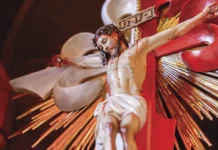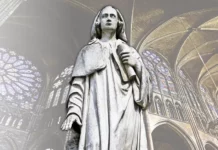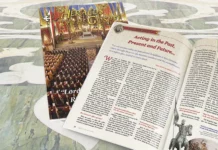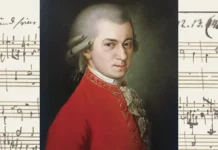If there were no life after death, there would be no reason to practice virtue. With His Resurrection, Christ purchased ours, giving us the certainty that we will reign with Him eternally.
A great silence reigns in the room. From time to time it is interrupted by sorrowful sobs and lamentations for the loss of someone who was with us yesterday and is no more…
A lady approaches the coffin with gestures of grief, a friend of the deceased weeps disconsolately, another makes a sign of the Cross. Sadness pervades those who were close to or who were benefitted in some way by the deceased. Many withdraw from the coffin with a sombre expression, disturbed by the contact with the lifeless body, so pallid and cold. It must be buried soon, for if not, an odour will begin pervade the area.
Outside, conversation is subdued. Some discuss the reasons for the tragic event, others recall episodes from the life of the one now lying motionless. Prestige, honours, wealth… or perhaps want and suffering… Everything is gone!
Who among us has ever known our great-grandfather? Or our great-great-grandfather? In most cases cases the reply will be negative, for they died some time before our birth. And just as they did, so will we, sooner or later. What a dreadful perspective!
However, the Catholic spirit faces this inevitable reality filled with hope, for we believe that Our Lord Jesus Christ conquered death with His glorious Resurrection: “I died, and behold I am alive for evermore, and I have the keys of death and Hades” (Rev 1:18).
Incontestable proof
From earliest antiquity until the present time, much has been said on the end of human life, and perhaps no reality is as universal as death.
Men can dispute and raise doubts over truths that are hard to hear. Nevertheless, against the proof of death, no one can object, for although it is an unknown for everyone, there is no escaping it. “The sentence of death is written against all men: thou art man and thou shalt die,” 1 affirms the great moralist St. Alphonsus Maria de Liguori.

“The first absolutely certain truth of our life, beyond the fact that we exist, is the inevitability of our death. Given this unsettling fact, the search for a full answer is inescapable. Each of us has both the desire and the duty to know the truth of our own destiny. We want to know if death will be the definitive end of our life or if there is something beyond – if it is possible to hope for an afterlife or not.” 2
Time passes quickly. Death approaches everyone like a thief, without giving notice of the day or hour of its arrival. It asks no leave, it respects no plans; it makes no deals. Therefore the psalmist sings: “Thou turnest man back to the dust, and sayest, ‘Turn back, O children of men!’ For a thousand years in thy sight are but as yesterday when it is past, or as a watch in the night” (Ps 90:3-4).
What is death?
Just as biologists have not managed to come up with a precise definition of life, it is also difficult for anyone to explain death. St. Thomas gives us some concise notions: “death is a fall from life.” 3 Or “death in us is the separation of the soul from the body.” 4 A violent separation, for the substantial unity of the human person, matter and spirit, is dramatically rent at this moment.
God took the body of Adam from clay of this material earth and breathed life into it, giving him a spiritual soul: “the Lord God formed man of dust from the ground, and breathed into his nostrils the breath of life; and man became a living being” (Gn 2:7). The body, being material, is corruptible; without its vital principle, it begins to decompose. The soul has another life, which is eternal, thereby surviving after the body dies.
So that these two elements, contradictory in themselves, would not oppose one another, the Creator gave the first man the preternatural gift of immortality, which brought his composite nature into harmony. However, after sin was committed, God withdrew this gift and left man to the merely natural laws, by which the body is doomed to return to the earth from which it was taken: “you are dust, and to dust you shall return” (Gn 3:19). Meanwhile, the soul, being incorruptible in its nature, subsists separately.
With the dissolution of the unity of his being, at the hour of death, man suffers terrible pain. To gain a pale idea of it, let us imagine someone tearing the nails out of our hands and feet, all at once, with a pair of pliers. This separation would cause us atrocious suffering, but much less than occurs at the separation of body and soul, intimately united as matter and form!
Introduced into history by sin
In the state of original innocence, as we saw, by the gift of immortality, man would not have died. However, by allowing themselves to be deceived by the serpent, Adam and his wife fell prey to the false promise of the devil. For since the latter never gives what he promises – on the contrary, this is what he takes away! – they lost the preternatural gifts and the dominion they had over nature.
The pains to which they fell subject affected all of their descendants. The greatest of them was the privation of the state of grace in which our first parents had been created. Their souls, once immaculate, became stained by sin. The tragedy of death came to be part of human life.
We can imagine what Eve must have felt, expelled from terrestrial paradise, when confronted with the fratricide perpetrated by Cain. The first person in history to die was her own son, Abel, murdered by his brother out of envy. Only then did she fully comprehend the terrible end that awaited all of humanity, until the consummation of the ages.
It was sin that introduced death into history, for as St. Augustine teaches, with the fall of our first parents, their bodies were invaded by “a certain disease which was conceived in men by a sudden and pestilential invasion of corruption, and they lost the immutable vigour of life in which they were created, and, by reason of the mutations which they experienced in the stages of life, set out on the path to meet death. Subsequently, however many were the years they went on to live, they began to die on the day when they received the law of death, because they were constantly approaching the decay of old age.” 5
It is from this perspective that we understand the Scripture, when we read: “God did not make death” (Wis 1:13). It was, then, by man’s fault that death came to be, even though there was in it “an aspect of good, namely as being a just punishment” 6 for the fault committed.

In Christ shall all be made alive
It is also written that “through the devil’s envy death entered the world” (Wis 2:24). Did satan, therefore, triumph by introducing sin among men, and as a consequence, death? Never! The words of the sacred author are very enlightening, when he affirms that “the dominion of Hades is not on earth” (Wis 1:14).
Now, who would be able to offer sufficient reparation to overcome death? What act of a mortal human could atone for an offence committed against the infinite and immortal God? While such reparation would have to come from the human nature responsible for the sin, only an infinite offering could satisfy justice with God…
Who, then, would be capable of resurrecting and triumphing over death? Only the God-Man! “For as in Adam all die, so also in Christ shall all be made alive” (1 Cor 15:22), St. Paul affirms.
Such is the greatness of love manifested in the Incarnation, for “He had no power of Himself to die for us: he had to take from us our mortal flesh.” 7 “He himself bore our sins in His body on the tree, that we might die to sin and live to righteousness” (1 Pt 2:24). Therefore, “this was the way in which, though immortal, He was able to die; the way in which He chose to give life to mortal men: He would first share with us, and then enable us to share with Him.” 8
Being God, Jesus has the “power to lay down His life, and to take it again; but we have no power to live as long as we wish; and die we must, however unwilling: He, by dying, straightway slew death in Himself; we, by His death, are delivered from death.” 9
The most spectacular of victories
In the Gospel we read how Caiaphas plotted the Death of Christ, mysteriously prophesying: “it was expedient that one man should die for the people” (Jn 18: 14). And it is the same sacred Scripture that clarifies this mystery: “But we see Jesus, who for a little while was made lower than the Angels, crowned with glory and honour because of the suffering of death, so that by the grace of God He might taste death for every one” (Heb 2:9).
Giving Himself up to apparent defeat, the Saviour was obtaining the most spectacular victory over the devil and death. “The apparent catastrophe of Our Lord’s Passion and Death marks the irreversible and resounding defeat of satan. The latter, provoking the worst torments against Jesus, deluded himself, believing that he was headed for an extraordinary victory against the Good incarnate. In his madness he did not see that he was contributing to the glorification of the Son of God and the work of Redemption.” 10 In fact, the Death and Resurrection of Jesus were accomplished so that, “manifesting His power whereby He overthrew death, He might instill into us the hope of rising from the dead.” 11
“‘O death, where is thy victory? O death, where is thy sting?’ (1 Cor 15:55), the Apostle asks defiantly. By dying on the Cross, the Divine Redeemer not only conquered death, but also evil, and He left a divine and immortal institution founded upon solid rock – the Holy Catholic Church, His Mystical Body and source of every grace – which weakened and impeded the action of the race of the serpent, depriving it of the crushing and dictatorial power that it wielded over the ancient world.” 12
If there were no resurrection, there would be no reason to make any effort to practice virtue. If death were the end of everything, there would be no rationale for renouncing a life of unrestrained pleasure. With His Resurrection, Christ purchased ours, giving us the certainty that we will reign with Him eternally. Thus, the tragedy of death and the terrible pain that devastated all of humanity were transformed into instruments of victory. With the Resurrection of Christ, death, which appeared to be a dreadful end, became the door to glory for all those who follow Him and are born to true life in Him. ◊

The Immortality of the Soul Demands the Resurrection
The Angelic Doctor says that, as the soul is essentially the form of the body, it is, consequently, “contrary to the nature of the soul to be without the body. But nothing which is contrary to nature can be perpetual. Perpetually, then, the soul will not be without the body. Since, then, it persists perpetually, it must once again be united to the body; and this is to rise again. Therefore, the immortality of souls seems to demand a future resurrection of bodies” (ST. THOMAS AQUINAS. Summa contra Gentiles. L.IV, c.79, n.10).







